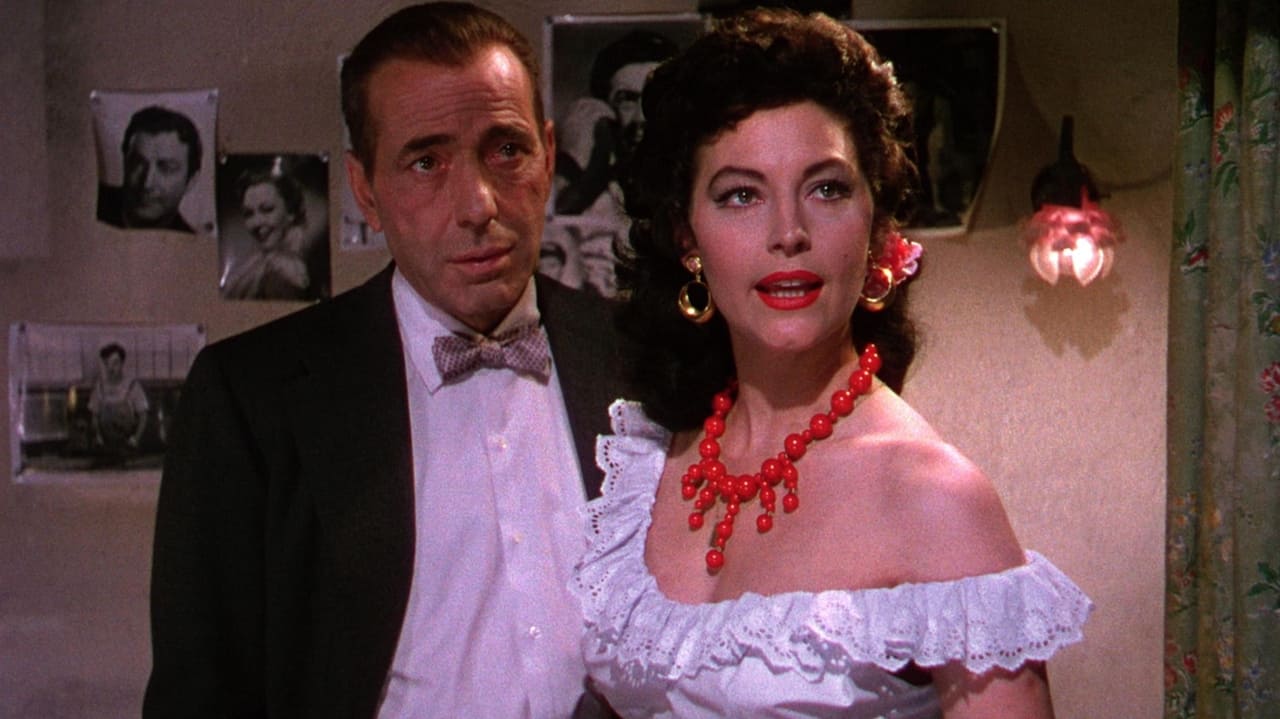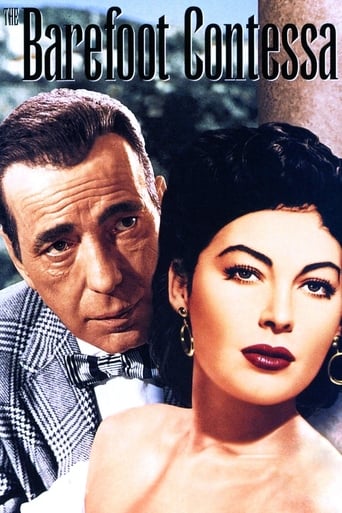TheLittleSongbird
Was really intrigued into seeing 'The Barefoot Contessa'. Joseph L Mankiewicz was responsible for 'All About Eve', which is one of my all time favourite films, and when you have the likes of Ava Gardner, Humphrey Bogart and Edmond O'Brien one does expect a lot.'The Barefoot Contessa' was disappointing. It is a long way from an awful film and has several very good things, but with such a talented cast and a director who was really good when he is in his prime it could have been so much more. Can totally see the polarising reactions on both sides, while 'The Barefoot Contessa' has a good deal to admire (more so than has been given credit for) it is not going to appeal, and has not appealed, to everybody. 1954 saw some great films, 'Rear Window', 'On the Waterfront', 'A Star is Born', 'Sabrina', 'Dial M for Murder', 'White Christmas' and '20,000 Leagues Under the Sea', 'The Barefoot Contessa' to me just isn't in the same league.Starting with what is good about 'The Barefoot Contessa', it looks great visually with beautiful autumnal cinematography and sumptuous costumes and settings, the very meaning of extravagant. The music score from Mario Nascimbene is lush and subtly done. There are some cracking lines and there is evidence of sincerity. Was very surprised at how daring and ahead of its time it was.Ava Gardner lives up to her glamorous "the world's most beautiful animal" image and character and is positively luminous and graceful, she is very much in her prime here. Late-career Humphrey Bogart, rightly regarded as a cultural icon who died far too soon (only three years later), is as commanding as ever and not only the best actor in the cast but also one of the film's strongest elements. Edmond O'Brien is deliciously oily and in his best moments on dynamite form. Warren Stevens is very good too.Rossano Brazzi was the weak link however in the cast, his role has little if anything to it and the only thing Brazzi brings to it is handsome looks, everywhere else he's very wooden and dull. Mankiewicz really is not at his best in the directing, he delivers on the style but elsewhere it's pedestrian and uninspired.His writing fares even weaker, despite some moments of sincerity and cracking lines the acerbic wit that sparkled in 'All About Eve' four years earlier does not come through enough. Most of the film is too talky and rambling, as well as overwrought, flimsy and too rehearsed. The thin and sometimes muddled story does suffer from dull pacing that rarely fires on all cylinders and an overlong length, and feels both overblown as a result of being overwritten and bland due to the lack of depth to the writing and characterisation. Despite the great efforts of the cast the characters are under-explored and don't have much to allow us to connect properly with them.Overall, beautiful but uneven. 5.5-6/10 Bethany Cox
edwagreen
Disappointing film revolving about life among the rich and famous, and it's not all wine and roses either.As the Spanish dancer, Ava Gardner, filled with frustration and from a bad home environment, rises to fame thanks to director Humphrey Bogart and a loud mouth press agent, Edmond O'Brien's Oscar winning supporting performance. Get one thing straight, while O'Brien played Oscar Muldoon to the hilt, the only reason why he won was because Rod Steiger, Karl Malden and Lee J. Cobb all received Oscar nominations for "On the Waterfront," that year and obviously knocked each other out. The other nominee was Tom Tully for "The Caine Mutiny.As Maria Vargas, Gardner achieves world fame, but leaves the movies after 3 films and has flings with a variety of wealthy, rotten men to the core before finally landing in the arms of the wealthy Count,played by Rossano Brazzi. They wed and tragedy ensues when he confesses something about himself and she hopes to keep the family name going.Boredom among the wealthy is also depicted here, but this idea of a Cinderella tale is ridiculous, for the latter ended happily and this one with a bullet.
ElMaruecan82
"Life, every now and then, behaves as though it had seen too many bad movies". Coming from Joseph L. Mankiewicz, as accomplished a writer as a director, this remarkable preterition works like a clever warning: don't get too fast on accusing the script to be too formulaic, talky or hackneyed, "The Barefoot Contessa" is set in a world of pretension, from Hollywood to the European jet-set, behavior is dictated by predefined codes, by a person's aura or by a hierarchy that never tells its name, whose people are all characters guided by the writing and directing of a divine instance, called fate.But I must say I was disappointed when I learned that the story of Maria Vargas, "The Barefoot Contessa", was based on Rita Hayworth, or some actress named Anne Chevalier. It was too great a coincidence but I thought it was meant to be from and of Ava Gardner, and only Ava Gardner, for her biography is one of these peculiar cases when reality is strangely more fascinating than fiction, especially when the kind of fiction we're talking about is fairy tale. Now I even realize that "The Barefoot Cinderella" who'd have been quite a fitting title, if only to sustain the idea that this was a princess who had everything to triumph over adversity, looks, heart and that inspiring sparkle in the eye, but no Prince at all… and what more tragic than a Cinderella remaining barefoot? And Ava Gardner was that kind of Cinderella-figure. She was uniquely beautiful; she was revered as one of the most beautiful actresses of the world, if not the most. And despite all the looks she had, and the stardom she was brought to, she never felt totally happy, she had only three men, no children, and left the silver screen with mixed memories. How can a woman blessed by such a voluptuous body and illuminating face, kept such a miserable opinion on a success served on a silver, no, golden plate? That's the kind of mystery "The Barefoot Contessa" tries to give answers, and if seriously, they didn't think about Gardner before writing the story, then her casting, is quite a strike of genius.The film opens when producer Kirk Edwards comes to a Spanish bar with his publicist Oscar Muldoon (Oscar-winning Edmund O'Brien) and director-writer Harry Dawes (Humphrey Bogart) to find a new face. They heard of a beautiful dancer named Maria Vargas but she trusts neither of Edwards or Muldoon. It's to Dawes that she finally opens her heart, expressing her fear of success, her eagerness to keep her feet on the dirt, as if the heights of success would make her dizzy. She likes movies though, but she doesn't trust herself, nor her capability to find love in this world, let alone there. This is not the little girl from Madrid slums talking, this is the earthy daughter of North Carolina who loved to go barefoot before luck brought her to MGM. But Cinema for Dawes is as unimaginable without Maria than ours without Ava, he convinces her give happiness the benefit of the doubt.The relationship between Dawes and Maria is particularly poignant and given the two actor's age more acceptable than Bogart with Hepburn in the film of the same year "Sabrina". Maria is a beautiful flower waiting to bloom and Dawes her guardian angel. But after three movies made together, she was able to fly with her own wings, and became a star among the stars, as admired as envied. The story is told from flashbacks during her funereal from Dawes, Muldoon and Maria's two lovers, a frivolous Latin American playboy Alberto Bravano (Marius Goring), and Count Vincenzo Torlato-Favrini (Rossano Brazzi). And what is interesting is less the relationship she has with these men than the way she gets into and out off one's arms, before her tragic ending.All through the film, we never know to which extent Maria lead her destiny, she's indeed a fairy-tale heroine with enough determination and courage to seize the situation but still guided by destiny. She was reluctant to go with Bravano, but only because Edwards forbid her, she challenged him. Then she challenges Bravano, by turning her back on the decadence of casinos and jet-set, and still dance on the mud near a Gypsy camp and this is where the Count meets her. The Counts has everything of a Charming Prince, but seems to hold a terrible secret, which would ultimately seal Maria's fate, the one that kept Cinderella forever barefoot, and to which the erected statue plays like a poignant epitaph.It's true that some choices, some actions are questionable given the context of the film, and their purposes seem to be their convenience to a plot leading to its tragic conclusion, but it's all in the 'bad movies' line as if Maria's life was in fact, the worst movie she ever made, and when every now and then, someone utters a kind of corny line, it's like the screenwriter apologizing in advance. That whole intricacy between reality and fiction is cleverly handled, which is not surprising coming from the director of "All About Eve", whom the film borrows some elements through the opening and the different perspective of Maria's life from the others' perspective. "All About Eve" remains superior if only because it had the perfect balance between action and talk, I must admit in "Barefoot Contessa", Mankiewciz took our patience for granted, which didn't leave much screen time to the most dramatic and poignant parts. Appreciating "The Barefoot Contessa" is understanding some bits of Ava Gardner, an unusual star who despised her stardom because she felt there was more to life than playing the star, and incongruously, that kind of attitude made her an even more glorious star, because paraphrasing Bogie, that's the stuff great movies are made on.

